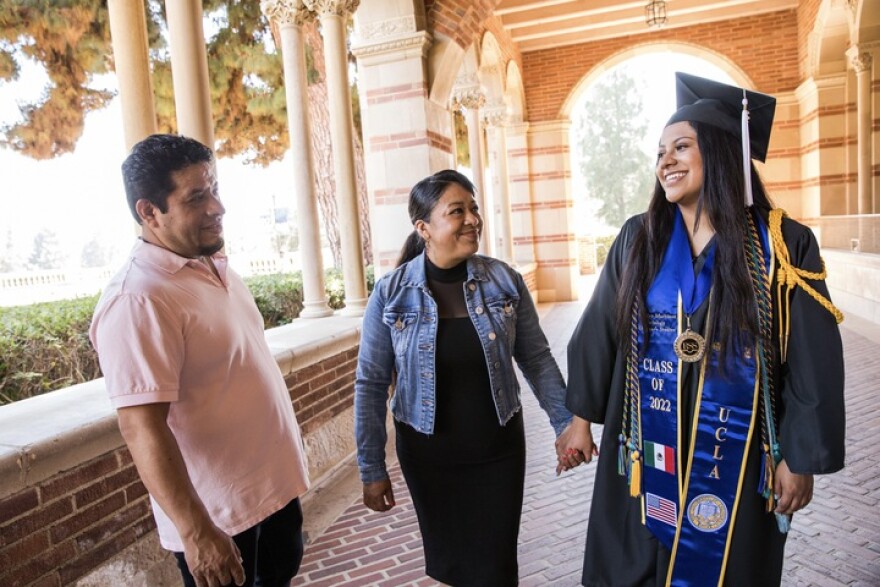What Support Do Community College Students Need To Transfer?

Marilyn Martinez said she graduated high school wondering if she was “good enough.”
She was one of a handful of Latino students at a predominantly white campus, where many of her classmates’ parents had careers in law and medicine. No one in Martinez’s family had gone to college. Her teachers steered her away from Advanced Placement courses.
Compared with her classmates, Martinez often felt she was lacking.
“I was doing well,” she recalled. “But I wasn't thriving.”
After she enrolled at Pasadena City College, however, Martinez bloomed. A counselor called her in to say she had the grades to transfer anywhere.
“Even Harvard?” she joked.
“Yes,” he told her. And he wasn’t kidding. The community college staff encouraged Martinez to be ambitious.
-
Conference aims to boost graduation rates
-
Listen: Campus Gaza protests, snitch scandal, more
-
Gaza solidarity camps in L.A., Riverside, Irvine
And to pursue her academic goals, she wanted the kind of support she didn’t get in high school.
Research shows most community college students aspire to earn a bachelor’s degree, but only about a third transfer to a university. The numbers are even more dismal for students who’ve been historically underrepresented. What kind of guidance these students receive can often be critical to whether or not they transfer and graduate.
When Martinez thought about next steps, she knew she wanted to stay close to home. On a campus bulletin, she saw a flyer for a program at UCLA, geared at helping prospective students transfer. She applied on a whim, in part because it promised a chance to live in the dorms. That program proved to be transformative.
Martinez went on to earn a bachelor’s degree at UCLA. Today, she works for that program, helping others do the same.
What does the Scholars Program provide, and who’s eligible?
Earlier this year, a report from Columbia University’s Community College Research Center found that “[d]espite surveys indicating that nearly 80% of community college students aspire to earn a bachelor’s degree, only about a third transfer to a four-year institution.”
And among those who manage to transfer, less than half go on to earn a bachelor’s degree within six years of enrolling at a community college.
The study, which examines state-by-state transfer rates and outcomes by student subgroup, also found that low-income students (11%), students who are 25 years or older (6%), Black students (9%), and Latino students (13%) transfer and complete bachelor’s degrees at even lower rates than community college students overall (16%).
The Scholars Program is run by UCLA's Center for Community College Partnerships. It aims to disrupt bleak transfer rates by providing targeted support for students who’ve been historically underserved in higher education. This includes — but isn’t limited to — students who are the first in their family to go to college; students from low-income backgrounds; formerly incarcerated students; parenting students; undocumented students; former foster youth; and men of color.
CCCP has partnerships with 17 community colleges in Southern California. At these campuses, program coordinators like Martinez — who are often transfer students themselves — help prospective students learn about what it has to offer. Then, once the students are admitted, they gain access to a year’s worth of free guidance.
-
- All new, continuing, or returning California community college students are eligible for the program. This includes high school seniors who plan to enroll at a community college, as well as students who are returning to community college after years of being away.
- There is no GPA requirement.
-
The application opens in late spring.
In the summer, students have the option of taking a UCLA class for six weeks, giving them a chance to earn UC credit before they even transfer. Students can also partake in the program’s residential experience.
These students “get to stay at a dorm, immersed in campus life,” said Aaron Tann. He is the center’s innovation coordinator, working to spread awareness about the program online. Tann also oversees the center’s partnerships with Antelope Valley College, Compton College, and Long Beach City College.
The overnight option, he said, really enables students “to see themselves at a place like UCLA.” Tann speaks from experience; just a few years ago, he attended Citrus College in Glendora.
For students who are more pressed for time, the program offers one-day campus visits, complete with a tour and networking opportunities, as well as webinars.
All options have the same content, Tann said. They’re offered in different ways to ensure students from all walks of life can participate.
After the summer, the community college students are paired with a peer mentor, often a current UCLA student who transferred from the same school. In the fall, the program provides guidance with college applications — regardless of whether the community college students plan to pursue a degree at UCLA or anywhere else. This support includes feedback on the students’ answers to the UC system’s personal insight questions, which are meant to distinguish applicants from the crowd.
In the winter, the program helps students get financial aid. Students learn about grants, loans, and scholarships, of course. But through webinars like “Hustlenomics,” Martinez said they’re also encouraged to think creatively about ways to fund their education, including having a side gig for extra cash. Come spring, the community college students prepare to transition to a university.

UCLA's transfer admission rate is about 26%. By comparison, 95% of Scholars Program participants are admitted to at least one UC, and 50% are admitted to UCLA, Tann said via email.
Beyond academics and financial aid
In addition to financial aid workshops and application support, the Scholars Program provides opportunities for students to connect with other prospective transfer students, educators, and professionals.
These experiences, Tann said, are significant because they enable students to learn about specific resources and connect with communities that already exist at UCLA.
When Tann was a community college student, for instance, he appreciated the programming for men of color. These gatherings, he said, gave prospective students “a space for us to be vulnerable and share without any judgment.” The students, Tann added, also had a chance to speak with male professionals of color about their college experiences.
Those opportunities to build community proved to be long-lasting. When Tann transferred to UCLA, he sometimes bumped into other men of color who’d been in the program. When they did cross paths, they’d greet each other with an enthusiastic “MOC!”
-
The Men of Color Action Network, which is devoted to helping community college students succeed, hosts an annual conference. This year’s conference will take place on April 26 at Long Beach City College.
You belong
The program also finds a role for family members.
When Martinez was a student at Pasadena City College, her mom accompanied her to UCLA for the summer dorm experience. Before dropping her off, she wanted to know her daughter would be safe.
The program hosted a family welcome. Martinez grew worried. This required that prospective students and their parents break off into separate groups.
“I didn't want to split up from my mom,” she said. Her mom predominantly speaks Spanish, so Martinez was accustomed to sitting together at “every school-related thing, explaining the context [and] maybe translating.”
Martinez’s mom noticed she was worried. “It’s fine,” she told her daughter. “If I need you, I’ll text you.”

When Martinez and her mom regrouped, she learned that her mom had heard from a UCLA student who was graduating alongside her children. Plus, because the parent session had been in Spanish, Martinez’s mom had felt comfortable asking questions about how to support her daughter with the transfer process.
“It was really life-changing, not just for me but for her as well,” Martinez said.
Another thing Martinez appreciated about that experience was a campus tour that emphasized the contributions of student activists, people of color, and those from working-class backgrounds.
When she and her cohort passed by Royce Hall, their tour guide pointed out the building’s red bricks. Martinez learned that every brick at UCLA was made by Mexican laborers at the Dixon brickyard in East Los Angeles.
“And they were saying: ‘This place was made by people like us. So if you don't feel like you belong, you do,’” she recalled.
Martinez graduated from UCLA in 2022, with a degree in sociology and Chicana and Chicano studies. When she spoke at her commencement ceremony, she recognized an old high school classmate in the crowd, someone whose intellect she’d marveled at as a teenager. It felt good to know they were in the same place.
-
The hundreds of thousands of students across 23 campuses won't have classes.
-
Over 100 students from Cal Poly Pomona and Cal Poly San Luis Obispo learned life-changing lessons (and maybe even burnished their career prospects).
-
The lawsuit was announced Monday by State Attorney General Rob Bonta.
-
Say goodbye to the old FAFSA and hello to what we all hope is a simpler, friendlier version.
-
The union that represents school support staff in Los Angeles Unified School District has reached a tentative agreement with district leadership to increase wages by 30% and provide health care to more members.
-
Pressed by the state legislature, the California State University system is making it easier for students who want to transfer in from community colleges.






